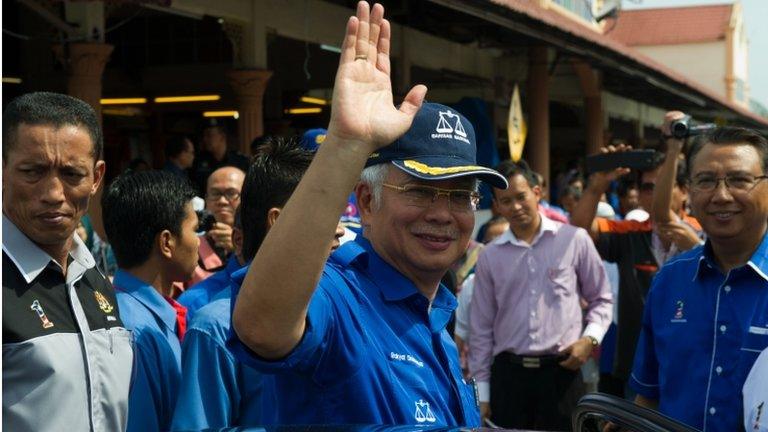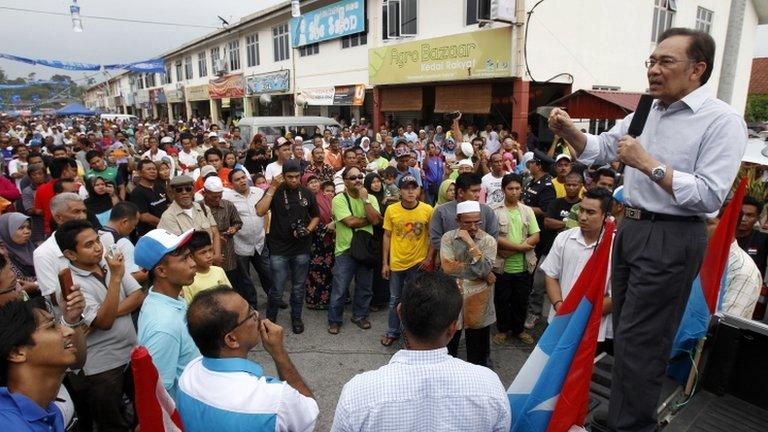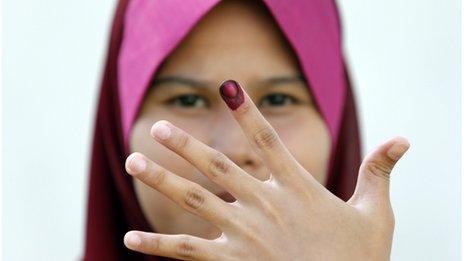Malaysia's Anwar Ibrahim urges protest over poll defeat
- Published
Anwar Ibrahim: "I am disgusted at the fact that... they could steal an election"
Opposition leader Anwar Ibrahim has urged supporters to stage a protest after Malaysia's ruling coalition won polls he said were marred by fraud.
His call came as PM Najib Razak was sworn into office after his Barisan Nasional (BN, National Front) coalition won 133 of the 222 parliamentary seats.
Mr Anwar's three-party alliance secured 89 seats on Sunday in the country's closest polls since independence.
The BN has been in power in Malaysia for more than half a century.
The polls saw an 80% voter turnout, amid strong campaigning from both sides.
The BN secured a simple majority but failed to regain the two-thirds parliamentary majority it lost for the first time in 2008.
Mr Anwar, who called the results the worst in Malaysia's history, said it did not reflect the will of the people.
He said that while his coalition has advised supporters against mass rallies, "we must be allowed to express ourselves properly in stadiums or in the vicinity of a public space".
A protest is scheduled to take place outside the capital, Kuala Lumpur, on Wednesday.
'Failed' elections
Mr Anwar said the authorities had rejected "the true aspirations of Malaysians wanting reform" and accused the Election Commission of being "complicit in the crime" of fraud.
"I don't think they are the best person to assure us that the election is free," he told the BBC.
He added that there were "specific incidents" of voter fraud involving foreign nationals.
Independent pollster Merdeka Center cited unconfirmed reports of foreign nationals being given ID documents and being allowed to vote.
Some of those who voted in advance said that indelible ink on their hands - supposed to last for days and show they had already voted - had easily washed off.
The opposition also accused the government of funding flights for supporters to key states, which the government denied.
Ahead of the polls, Malaysia's Election Commission said it had done all it could to keep the polls clean.
This result is a bitter blow to the opposition coalition, after a spirited campaign that tapped into a hunger for change among many younger Malaysians, the BBC's Jonathan Head in Kuala Lumpur reports.
They had believed a surge of support, especially in urban areas, would be enough to unseat a ruling coalition that has been in government for more than half a century, our correspondent adds.
Thousands of opposition supporters swapped their Facebook profile photos for black boxes to show their dismay when they learned that the ruling coalition had retained power, AP news agency reported.
'Tsunami'
Mr Najib, 59, was sworn in as prime minister by Malaysia's king on Monday afternoon.
Speaking after his coalition's election victory, he urged all Malaysians to accept his coalition's victory but acknowledged there was work ahead.
"One of the programmes we will undertake is national reconciliation... I think we realise that there are a lot of things we have to do as a party," he said.
He noted that ethnic Chinese voters had turned to the opposition, which has pledged to reform the government's affirmative action policies that benefit ethnic Malays, in what he called "a Chinese tsunami".
"The results show a trend of polarisation which worries the government. If it is not addressed, it can create tension or division in the country," Mr Najib said.
Unconfirmed reports suggested that the coalition did not receive a majority of the popular vote.
Tallies by independent online media gave the BN coalition 49%, which would make Mr Najib the first leader to win with a minority of the popular vote, AFP news agency reported.
Malaysian shares reacted positively to news that the BN had won.
The FTSE Bursa Malaysia KLCI Index jumped as much as 9.5% to a lifetime high of 1,826.22 in early trade on Monday, before ending the day higher by 3%.
The local currency, the ringgit, hit a 10-month high.
- Published28 July 2020

- Published24 November 2022

- Published1 May 2013

- Published2 May 2013
